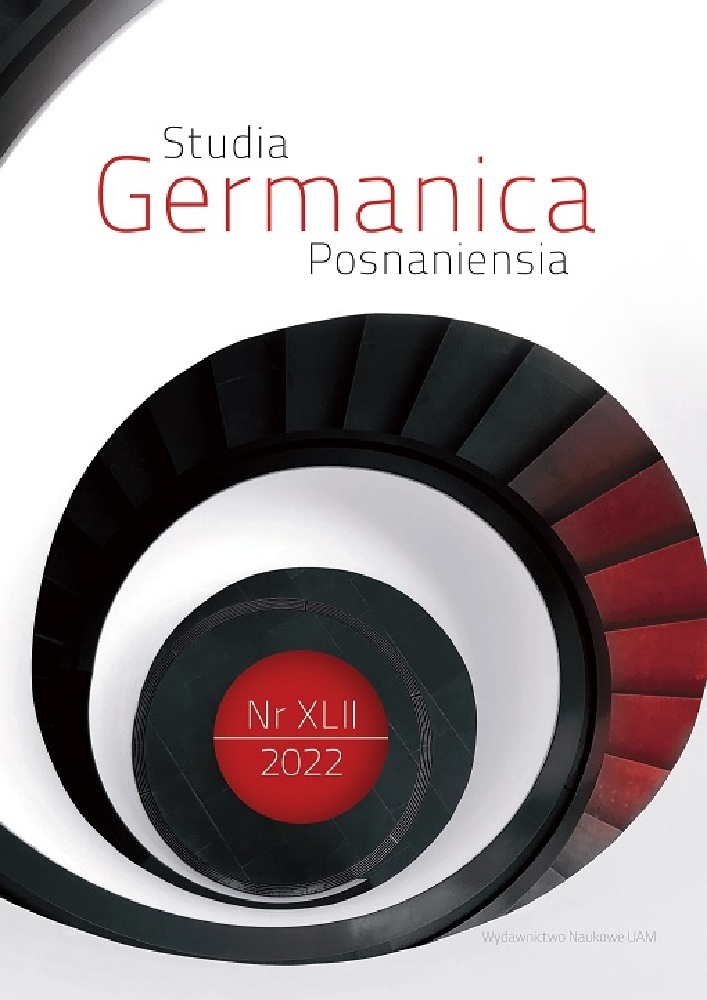Abstract
Post-anthropocentric tools are needed to think about relations between humans and more-than-human others. In order to meet the challenges of the interspecific entanglements and interdependencies of a postmodern world, alternative models of collectivity must be designed from scratch with heterogeneous actors in mind. In Saša Stanišićʾs narrative Fallensteller [Trapper] and Olga Tokarczukʾs novel Drive Your Plow Over the Bones of the Dead, human and more-than-human protagonists engage in extraordinary relationships with each other. These are analyzed here based on Gesa Ziemer’s theoretical work on complicities as ‘multispecies complicities’. This new perspective on more-than-human collaborations aims to go beyond literary studies to explore multispecies collectives.
References
Belliger, A., & Krieger, D.J. (Hrsg.). (2006). ANThology. Einführendes Handbuch zur Akteur-Netzwerk-Theorie. Bielefeld: transcript.
Elze, T. (2015). Die gefeierte Linie: Rituale und Komplizenschaft an der US-mexikanischen Grenze. Bielefeld: transcript. DOI: https://doi.org/10.14361/9783839431504
Fiebig, P. (2021). Natur als Rechtssubjekt. Klimaschutz per Gericht. Radiofeature. Deutschlandfunk. Ausgestrahlt am 21.22.2021. Abgerufen von https://www.deutschlandfunk.de/klimaschutz-per-gericht-natur-als-rechtssubjekt-100.html.
Gell, A. (1996). Vogel’s Net: Traps as Artworks and Artworks as Traps. Journal of Material Culture, 1 (1), 15-38. DOI: https://doi.org/10.1177/135918359600100102
Haraway, D.J. (1989). Primate Visions: Gender, Race, and Nature in the World of Modern Science. New York: Routledge.
Haraway, D.J. (2003). The companion species manifesto. Dogs, People, and Significant Otherness. Chicago: Prickly Paradigm Press.
Haraway, D.J. (2016). Staying with the trouble: Making kin in the Chthulucene. Durham: Duke University Press. DOI: https://doi.org/10.2307/j.ctv11cw25q
Hadfield, M.G., & Haraway, D.J. (2019). The Tree Snail Manifesto. Current Anthropology, 60 (20), 209-235. DOI: https://doi.org/10.1086/703377
Kaiser, L., & Ziemer, G. (2014, Dezember 1). HCU-Professorin Ziemer über Komplizenschaft: „Mit ist produktiver als Gegen“. Die Tageszeitung: taz. Abgerufen von https://taz.de/!5027257/.
Kohn, E. (2007). How dogs dream: Amazonian natures and the politics of transspecies engagement. American Ethnologist, 34 (1), 3-24. DOI: https://doi.org/10.1525/ae.2007.34.1.3
Latour, B. (1998). Wir sind nie modern gewesen. Versuch einer symmetrischen Anthropologie (G. Rossler, Übers.). Frankfurt a. M.: Fischer.
Latour, B. (2014). Eine neue Soziologie für eine neue Gesellschaft (3. Auflage). Frankfurt a. M.: Suhrkamp.
MMK – MUSEUM FÜR MODERNE KUNST (o.J.): Werke aus der Sammlung des MMK. Serie „Fallen“. Abgerufen von https://collection.mmk.art/de/nc/werkuebersicht/?werk=2000%2F52&serie=Fallen.
Peselmann, A. & Fenske, M. (2020). Wasser, Luft und Erde Gemeinsames Werden in NaturenKulturen – Zur Einleitung, 7, 7-24.
Setzer, J., & Higham, C. (2021). Global trends in climate change litigation: 2021 snapshot policy report. Grantham Research Institute on Climate Change and the Environment and Centre for Climate Change Economics and Policy, London School of Economics and Political Science.
Stanišić, S. (2016). Fallensteller. In Fallensteller (1. Aufl., S. 169-257). München: Luchterhand Literaturverlag.
Tokarczuk, O. (2011). Der Gesang der Fledermäuse (D. Daume, Übers.; Dt. Erstausg., 1. Aufl). Frankfurt a. M.: Schöffling.
Tsing, A.L. (2018). Der Pilz am Ende der Welt. Über das Leben in den Ruinen des Kapitalismus (D. Höfer, Übers.; Erste Auflage). Berlin: Matthes & Seitz.
Ziemer, G. (2013). Komplizenschaft: Neue Perspektiven auf Kollektivität. Bielefeld: transcript.
License
Copyright (c) 2022 Marlis Heyer

This work is licensed under a Creative Commons Attribution-NoDerivatives 4.0 International License.
